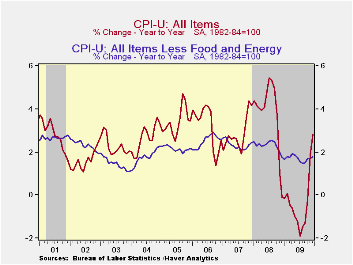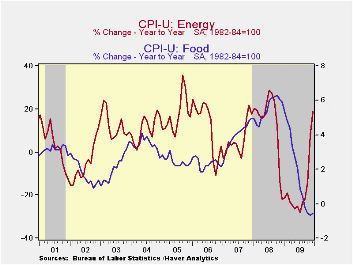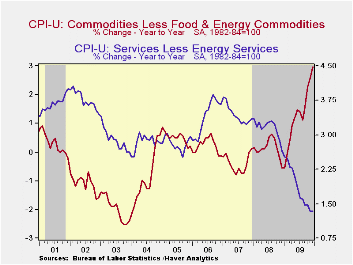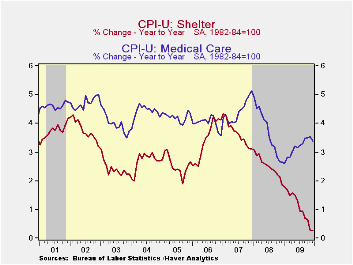 Global| Jan 15 2010
Global| Jan 15 2010CPI's 2009 Decline Is First Since 1955
by:Tom Moeller
|in:Economy in Brief
Summary
Some said earlier that it wouldn't happen, but last year it did. For all of 2009, consumer prices declined slightly. The 0.3% drop, the first since 1955, was pulled lower by a decline in energy prices. Since the energy price decline, [...]

Some said earlier that it wouldn't happen, but last year it did. For all of 2009, consumer prices declined slightly. The 0.3% drop, the first since 1955, was pulled lower by a decline in energy prices. Since the energy price decline, which mostly happened at the end of 2008, prices picked up. December-to-December the CPI rose 2.7% which was the fastest 12-month increase since October 2008. For December alone, the 0.1% CPI rise fell slightly short of expectations but followed stronger gains during the prior four months which were boosted by the rebound in energy prices.
 It was the weak economy, however, that lessened core pricing
power measured either way. For the full year prices less food &
energy rose 1.7% which was the weakest increase since 2003.
December-to-December prices rose a similar 1.8% and that too was the
weakest 12-month gain since 2003. In the latest few months prices
remained weak, up an expected 0.1% in December after no change during
November.
It was the weak economy, however, that lessened core pricing
power measured either way. For the full year prices less food &
energy rose 1.7% which was the weakest increase since 2003.
December-to-December prices rose a similar 1.8% and that too was the
weakest 12-month gain since 2003. In the latest few months prices
remained weak, up an expected 0.1% in December after no change during
November.
 Energy prices posted just a 0.2% increase
last month but the 19.0% 12-month gain reversed most of the 2008
decline. Gasoline prices rose 0.2%, after a strong 6.4% November rise.
They rose by more than half over twelve months and more-than reversed
the 2008 decline. Fuel oil prices also rose a firm 1.7% (2.5% y/y)
following the 7.3% November gain. This 12-month gain reversed just a
piece of the 13.5% decline during 2008. Finally, prices for natural gas
& electricity slipped 0.1% last month and over twelve months
declined 5.2%.
Energy prices posted just a 0.2% increase
last month but the 19.0% 12-month gain reversed most of the 2008
decline. Gasoline prices rose 0.2%, after a strong 6.4% November rise.
They rose by more than half over twelve months and more-than reversed
the 2008 decline. Fuel oil prices also rose a firm 1.7% (2.5% y/y)
following the 7.3% November gain. This 12-month gain reversed just a
piece of the 13.5% decline during 2008. Finally, prices for natural gas
& electricity slipped 0.1% last month and over twelve months
declined 5.2%.
Food & beverage prices remained weak, up just 0.2% in December. Moreover, the 12-month decline of 0.5% remained near the weakest since 1960. Recent weakness has been led by lower dairy prices (-7.6% y/y) and lower fruit & vegetable (-3.0% y/y) costs. Prices for meats, poultry, fish & eggs also fell 3.8% y/y while cereals & bakery product prices slipped 0.8%. Finally, nonalcoholic beverage prices slipped 0.9% but alcoholic beverage costs rose 1.9% following 4.5% and 3.8% twelve-month gains in the prior two years.
Core goods prices have been comparatively firm, rising 0.2% last month and 3.0% since December 2008. The increase followed little change during the prior several years. Higher tobacco prices continued to account for much of the recent strength with roughly a one-third increase y/y. New & used motor vehicles also firmed considerably. The 0.3% increase last month pulled them up 5.5% since December 2008. That compares with price deflation during the prior two years. Apparel prices also firmed. The 0.4% December increase pulled them up 1.9% since December 2008 following price declines which extend back to 1994. Continuing weak were prices for household furnishings & operation which were unchanged in December. The 1.1% decline since the end of 2008 reversed a 2.0% increase in 2008.
Core services prices
continued weak.  The 0.1% December uptick left them up just 1.3% for the
twelve months which was the weakest increase ever. Weakness in the
housing market continues to accounts for much of that moderation. Last
month, shelter prices were unchanged and rose just 0.3% for the year
after a 2.5% 2008 increase. Owners equivalent rent of primary
residences, a measure not equivalent to other house price measures,
slipped for the fifth month in the last six and rose just 0.7% in 2009
after a 2.1% increase during 2008. Elsewhere in services, public
transportation prices were strong again and posted a 1.4% December
increase which lifted them 3.2% y/y.Medical care services prices
increased 0.2% in December lifting them 3.4% since December 2008.
Finally, education costs remained strong with a 0.4% December increase
that lifted them 4.7% for the whole year after gains in excess of 5%
back to 2000. Recreation prices have really shown the recession's
effect and declined 0.4% in December for the fourth consecutive month
and by 0.4% y/y.
The 0.1% December uptick left them up just 1.3% for the
twelve months which was the weakest increase ever. Weakness in the
housing market continues to accounts for much of that moderation. Last
month, shelter prices were unchanged and rose just 0.3% for the year
after a 2.5% 2008 increase. Owners equivalent rent of primary
residences, a measure not equivalent to other house price measures,
slipped for the fifth month in the last six and rose just 0.7% in 2009
after a 2.1% increase during 2008. Elsewhere in services, public
transportation prices were strong again and posted a 1.4% December
increase which lifted them 3.2% y/y.Medical care services prices
increased 0.2% in December lifting them 3.4% since December 2008.
Finally, education costs remained strong with a 0.4% December increase
that lifted them 4.7% for the whole year after gains in excess of 5%
back to 2000. Recreation prices have really shown the recession's
effect and declined 0.4% in December for the fourth consecutive month
and by 0.4% y/y.
The chained CPI, which adjusts for shifts in consumption patterns, slipped -0.2% last month and rose 2.8% year-to-year. Conversely, chained prices less food and energy fell 0.2% for the second month and the 1.3% full-year increase was the weakest since 2003.
The consumer price data is available in Haver's USECON database while detailed figures can be found in the CPIDATA database.
| Consumer Price Index (%) | December | November | October | Dec. y/y | 2009 | 2008 | 2007 |
|---|---|---|---|---|---|---|---|
| Total | 0.1 | 0.4 | 0.3 | 2.7 | -0.3 | 3.8 | 2.9 |
| Total less Food & Energy | 0.1 | 0.0 | 0.2 | 1.8 | 1.7 | 2.3 | -- |
| Goods less Food & Energy | 0.2 | 0.2 | 0.4 | 3.0 | 1.3 | 0.1 | -0.4 |
| Services less Energy | 0.1 | -0.0 | 0.1 | 1.3 | 1.9 | 3.1 | 3.4 |
| Energy | 0.2 | 4.1 | 1.5 | 19.0 | -18.0 | 13.5 | 5.7 |
| Food & Beverages | 0.2 | 0.1 | 0.1 | -0.4 | 1.9 | 5.4 | 3.9 |
| Chained CPI: Total (NSA) | -0.2 | 0.0 | 0.1 | 2.8 | -0.5 | 3.3 | 2.5 |
| Total less Food & Energy | -0.2 | -0.2 | 0.3 | 1.5 | 1.3 | 1.9 | 1.9 |
Tom Moeller
AuthorMore in Author Profile »Prior to joining Haver Analytics in 2000, Mr. Moeller worked as the Economist at Chancellor Capital Management from 1985 to 1999. There, he developed comprehensive economic forecasts and interpreted economic data for equity and fixed income portfolio managers. Also at Chancellor, Mr. Moeller worked as an equity analyst and was responsible for researching and rating companies in the economically sensitive automobile and housing industries for investment in Chancellor’s equity portfolio. Prior to joining Chancellor, Mr. Moeller was an Economist at Citibank from 1979 to 1984. He also analyzed pricing behavior in the metals industry for the Council on Wage and Price Stability in Washington, D.C. In 1999, Mr. Moeller received the award for most accurate forecast from the Forecasters' Club of New York. From 1990 to 1992 he was President of the New York Association for Business Economists. Mr. Moeller earned an M.B.A. in Finance from Fordham University, where he graduated in 1987. He holds a Bachelor of Arts in Economics from George Washington University.
More Economy in Brief
 Global| Feb 05 2026
Global| Feb 05 2026Charts of the Week: Balanced Policy, Resilient Data and AI Narratives
by:Andrew Cates






